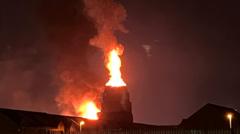Are Russian Tourists Discovering North Korea's New Resort Paradise?

### The Wonsan Kalma Resort: A New Chapter in North Korea's Tourism Amidst Human Rights Concerns
In recent years, North Korea has made headlines for many reasons, but the opening of the Wonsan Kalma Resort represents a significant development in the country’s tourism ambitions. This beach resort, hailed by North Korean leader Kim Jong Un as a "world-class tourist and cultural destination," has recently welcomed its first group of Russian tourists. However, this initiative has not been without controversy, as numerous human rights groups have raised alarms over the treatment of construction workers during its development.
This article delves into the intricacies surrounding the Wonsan Kalma Resort — from its ambitious plans to attract international tourists to the troubling reports of forced labor and human rights abuses.
### The Vision Behind Wonsan Kalma Resort
#### Historical Context
Wonsan, a city known for its scenic coastline and favorable climate, has a long-standing reputation as a vacation spot for North Korea's elite. Kim Jong Un spent much of his youth in Wonsan, and the area has been a favored retreat for the country's leadership. The ambitions for the Wonsan Kalma Resort were conceived as part of North Korea’s strategy to open up to foreign tourists, with initial plans suggesting that the region could attract up to a million visitors annually.
#### Planning and Construction
In 2017, a North Korean delegation visited Spain to study successful resort models, including the renowned tourist destination of Benidorm. High-ranking officials and architects took extensive notes, aiming to replicate this success back home. The Wonsan Kalma Resort's blueprint includes 43 hotels, guest houses, and an aquatic park, showcasing an ambitious vision for a comprehensive tourist experience.
Construction began in 2018, and satellite images tracked the rapid development of the resort. By late 2018, approximately 80% of the resort had been completed. However, work on the site reportedly paused before resuming after a significant meeting between Kim Jong Un and Russian President Vladimir Putin in June 2024. This meeting marked a renewed commitment to fostering tourism, particularly from Russia.
### Human Rights Concerns: The Dark Side of Development
#### Forced Labor Allegations
Despite the grand vision, the construction of the Wonsan Kalma Resort has been shrouded in allegations of human rights abuses. The United Nations has documented a system of forced labor in North Korea, particularly through "shock brigades," where workers face grueling conditions, long hours, and poor compensation. Reports suggest that workers were coerced into completing the resort under extreme duress, with claims of individuals working up to 24 hours straight without proper breaks.
James Heenan from the UN Human Rights Office in Seoul remarked on the troubling nature of these reports, indicating that the treatment of workers aligns with documented practices of forced labor in North Korea.
#### Personal Accounts from Workers
Defector testimonies provide chilling insights into the harsh conditions faced by workers. Cho Chung Hui, a former manager of shock brigades, described the relentless pressure to meet construction deadlines, even at the cost of workers' health and lives. He recounted harrowing stories of women suffering severe physical strain, leading to life-altering health issues.
Another defector, Kang Gyuri, shared that her cousin volunteered for construction work in hopes of securing residency in Pyongyang, a privilege reserved for individuals trusted by the regime. However, the reality was grim, with reports of inadequate food and poor living conditions leading to devastating consequences. Kang noted the demolition of homes in Wonsan to make way for the resort, often without providing residents any compensation.
### The Economic Implications of Wonsan Kalma Resort
#### Boosting North Korea's Economy
The Wonsan Kalma Resort is seen as a crucial component in reviving North Korea's struggling economy. The government is hopeful that increased tourism, particularly from neighboring countries like Russia and China, will provide a much-needed influx of foreign currency. Early planning documents indicated an ambitious goal of attracting over one million tourists annually, a feat that could significantly bolster the nation's economy.
#### Tourist Appeal and Challenges
While North Korea is eager to welcome foreign visitors, the initial marketing efforts have been mixed. Although Russian tourist agencies are starting to promote trips to Wonsan Kalma, Chinese agencies have yet to include the resort in their offerings. The cost of a week-long trip to the resort is substantial, priced at $1,800 — significantly higher than the average monthly salary in Russia. The limited appeal of North Korea compared to other more accessible and comfortable destinations, such as Turkey or Thailand, poses a challenge for the resort's long-term success.
### The Role of International Relations
#### Strengthening Ties with Russia
The opening of the Wonsan Kalma Resort comes at a time when North Korea's relationship with Russia is growing closer, particularly in light of North Korea's military support for Russia during the ongoing conflict in Ukraine. The partnership is mutually beneficial, as Russia seeks to strengthen ties with North Korea amid international isolation.
#### Future Prospects
Experts in North Korean tourism express skepticism regarding the resort's ability to attract a significant number of visitors. Andrei Lankov, a specialist in Russian-North Korean relations, suggests that while the resort may attract a small number of tourists, it is unlikely to become a favored destination compared to other international options.
### Conclusion: A Complex Future for Wonsan Kalma Resort
The Wonsan Kalma Resort embodies the complexities of North Korea's ambitions to develop its tourism sector while grappling with serious human rights concerns. The juxtaposition of a luxurious vacation destination against the backdrop of forced labor and human rights abuses creates a paradox that cannot be overlooked.
As North Korea continues to navigate its international image and economic aspirations, the fate of the Wonsan Kalma Resort remains uncertain. Will it evolve into a thriving tourist hub, or will allegations of human rights abuses overshadow its potential?
### FAQs
#### What is the Wonsan Kalma Resort?
The Wonsan Kalma Resort is a newly constructed beach resort in North Korea, designed to attract international tourists, particularly from Russia and China.
#### Why are human rights groups concerned about the Wonsan Kalma Resort?
Human rights groups have raised alarms over reports of forced labor, particularly the use of "shock brigades" during the resort's construction, leading to harsh working conditions and inadequate compensation for laborers.
#### How much does a trip to the Wonsan Kalma Resort cost?
A week-long trip to the Wonsan Kalma Resort is priced at approximately $1,800, which is significantly higher than the average monthly salary in Russia.
#### Who is expected to visit the Wonsan Kalma Resort?
While the initial goal is to attract over a million tourists, the primary target audience includes visitors from Russia and China.
#### What are the implications of the Wonsan Kalma Resort for North Korea's economy?
The resort is seen as a vital component in reviving North Korea's struggling economy by providing an influx of foreign currency through tourism.
The opening of the Wonsan Kalma Resort presents a fascinating case study of the intersection of tourism, international relations, and human rights. As North Korea ventures into the tourism market, the world watches closely — not just for its economic potential but for the ethical implications of how such developments are realized. What are your thoughts on the balance between tourism and human rights in such contexts? #WonsanKalma #NorthKorea #HumanRights
Published: 2025-07-12 00:51:32 | Category: technology



